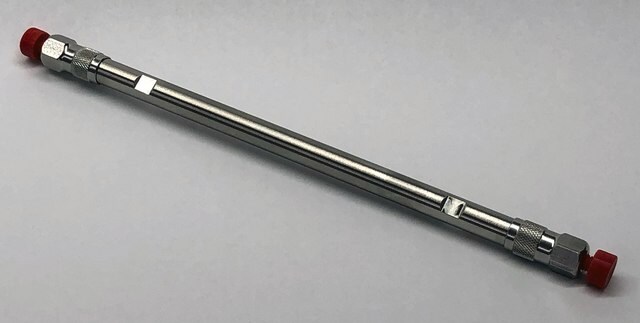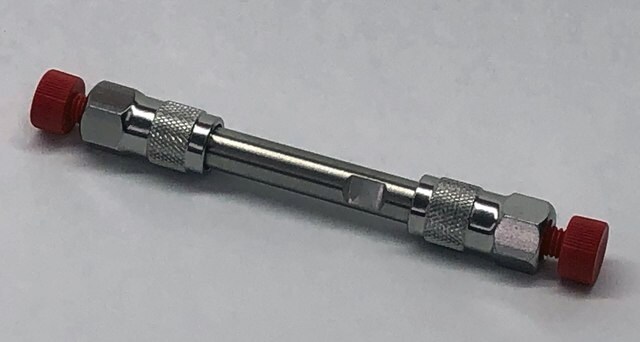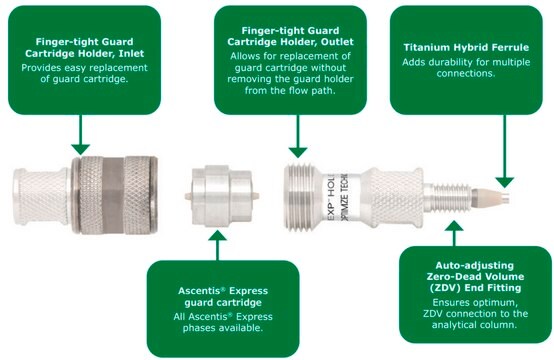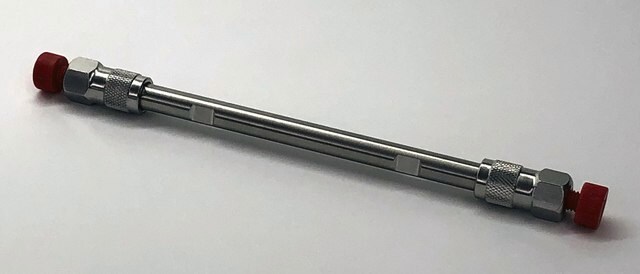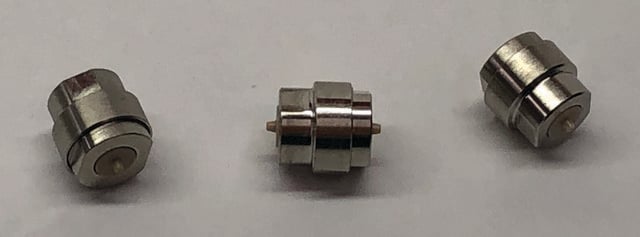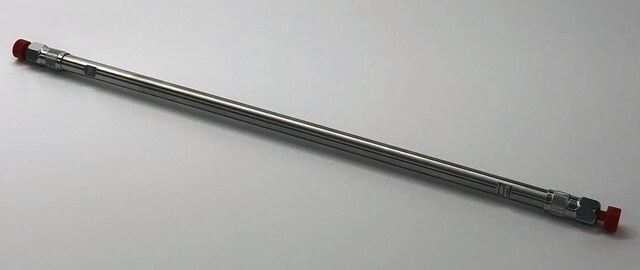53939-U
Ascentis® Express 90 Å HILIC (2.7 μm) HPLC Columns
L × I.D. 10 cm × 2.1 mm, HPLC Column
Synonym(s):
Core-shell (SPP) Fused Core Si HPLC column
About This Item
Recommended Products
product name
Ascentis® Express HILIC, 2.7 μm HPLC Column, 2.7 μm particle size, L × I.D. 10 cm × 2.1 mm
material
stainless steel column
Quality Level
Agency
suitable for USP L3
product line
Ascentis®
feature
endcapped: no
manufacturer/tradename
Ascentis®
packaging
1 ea of
parameter
≤100 °C temp. range
600 bar max. pressure (9000 psi)
technique(s)
HPLC: suitable
LC/MS: suitable
UHPLC-MS: suitable
UHPLC: suitable
L × I.D.
10 cm × 2.1 mm
surface area
135 m2/g
impurities
<5 ppm metals
matrix
Fused-Core particle platform
superficially porous particle
matrix active group
silica phase
particle size
2.7 μm
pore size
90 Å
operating pH
1-8
application(s)
food and beverages
separation technique
hydrophilic interaction (HILIC)
normal phase
Looking for similar products? Visit Product Comparison Guide
General description
Visit the Ascentis Express home page for more information on this new column technology.
Legal Information
Application
analytical column
guard cartridge
related product
required but not provided
Storage Class Code
11 - Combustible Solids
WGK
WGK 3
Flash Point(F)
Not applicable
Flash Point(C)
Not applicable
Choose from one of the most recent versions:
Certificates of Analysis (COA)
Don't see the Right Version?
If you require a particular version, you can look up a specific certificate by the Lot or Batch number.
Already Own This Product?
Find documentation for the products that you have recently purchased in the Document Library.
Articles
A significantly improved HPLC-fluorescence method for DMB-NANA and -NGNA, and application of this method to compare 2 candidate biosimilar therapeutic proteins to their respective RMs.
The combination of ion-exchange SPE with the HILIC HPLC separation provides a novel approach for the testing of problematic bath salt compounds.
This article highlights the impact that sample matrix effects can have on LC/MS response and discusses two novel approaches to reduce it.
For separation of polar compounds including polar neutrals, polar acids, and polar and non-polar basic amines use our Ascentis® Express HILIC column.
Protocols
Separation of Heroin, analytical standard, ≥98% (HPLC); Cocaine hydrochloride, analytical standard; D-Amphetamine hemisulfate salt solution, 1.0 mg/mL in methanol, analytical standard, for drug analysis; (±)-3,4-Methylenedioxymethamphetamine hydrochloride solution, analytical standard, for drug analysis, 1.0 mg/mL in methanol
Separation of 3,4-Methylenedioxypyrovalerone HCl (MDPV) solution, 1.0 mg/mL in methanol (as free base), ampule of 1 mL, certified reference material; Buphedrone hydrochloride solution, 1.0 mg/mL in methanol (as free base), ampule of 1 mL, certified reference material; 3-Fluoromethcathinone hydrochloride solution, 1.0 mg/mL in methanol (as free base), ampule of 1 mL, certified reference material; Butylone hydrochloride solution, 1.0 mg/mL in methanol (as free base), ampule of 1 mL, certified reference material; Ethylone hydrochloride, 1.0 mg/mL in methanol (as free base), ampule of 1 mL, certified reference material; 4-Fluoromethcathinone hydrochloride solution, 1.0 mg/mL in methanol (as free base), ampule of 1 mL, certified reference material; Mephedrone hydrochloride solution, 1.0 mg/mL in methanol (as free base), ampule of 1 mL, certified reference material; Methylone hydrochloride, 1.0 mg/mL in methanol (as free base), ampule of 1 mL, certified reference material; Methedrone hydrochloride solution, 1.0 mg/mL in methanol (as free base), ampule of 1 mL, certified reference material
Chromatograms
application for HPLC, application for SPEapplication for HPLCapplication for HPLCapplication for HPLCShow MoreOur team of scientists has experience in all areas of research including Life Science, Material Science, Chemical Synthesis, Chromatography, Analytical and many others.
Contact Technical Service